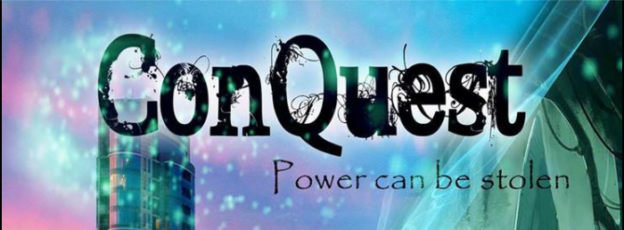Okay let’s take a break from the stroll down Doctor Who’s memory lane. I’d like to tell you a little story.
Long-term readers might recall that during my oft-neglected look back at past plays, I discussed the worst first draft I’d ever written, Quest, which given how I tore into some of my other early works is quite the damning statement. Yet still somehow earned, because this attempted blend of Ocean’s 11 and Lord of the Rings was basically unstageable.
I also mentioned that, years later, there were elements of the concept that I still kind of liked. I liked the idea of most of the characters, if not the execution. There was a moment, a key turning point for several characters, that could have been beautiful. That should have been beautiful. It was there, in my head, a moment of joy and perfect happiness right before things were scheduled to go wrong. I felt an overpowering need to try and do that moment justice.
And there began ConQuest.
Know Your Medium
When I started this mad project way, way back when, I had some friends who attempted to softball their disapproval of the script by saying that maybe stage wasn’t the venue. Maybe this was a novel, or something else.
I said no, I can make it work, because I’d seen Fringe plays that made weird or minimalist choices work and assumed anything is stageable if you’re determined. Well, that’s part of the truth. It’s a little true but underneath that was the fact that, having been running community theatre groups for nearly a decade, I knew how to get plays staged. I had no successful experience with film or with getting novels published. Or written. Not super at prose if I’m being honest.
No, this isn’t prose, this is conversational exposition. There is a difference.
Nothing said “This isn’t meant for stage” like the fact that everything interesting happened off of it. Everything. Every single thing. Because exposition and talkiness are so much easier to stage than magic and battles. Or the cons that should have been the central story mechanic.
So step one… if this story was going to work, if my one, perfect moment had any chance of existing, I had to write this thing for a genre that could actually support it. And while I’m still bad at prose, I had recently been seduced by Sweet Lady Film. So maybe it was a movie.
And when it passed the 150 page mark, maybe it was a series. So that’s what I turned it into.
Know Your Story
When writing the stage version, I had characters in my head, though only partially realized. I had a vague notion of the world, enough to fuel far too much exposition. But did I have a story? Only kind of sort of. I just started writing some stuff down and tried to build some rising action and threw in a sudden yet inevitable betrayal just to try to add value to the supposed lead, and none of it landed.
So this time I did a bit more legwork.
Know your story. Know where it’s going. Know how to tell it. If your story is about a con artist fighting a magic war, have cons. And action. The Fellowship of the Rings didn’t become The Fellowship of the Rings by standing around and talking about how cool they all were when the cameras weren’t running.
Now there are twists, turns, rising dangers and diminishing safety, action and cons. Plus characters people actually like, and moments that elicited gasps at the first reading.
Telling your story right is step two. But before you can tell your story right, you have to know what it is.
Get Good Advice
The first readers of the play version did their best. They tried, they really tried, to warn me away from it. But they also softballed it a little. They said “I don’t know if this will work” rather than “It will not work.”
Fortunately I had other friends willing to say that in no uncertain terms. Less fortunately, in a far more public venue.
So before I got attached to this new version, I called three close friends (including the two most vocal opponents of the stage version, you know, the ones from that last paragraph) and said “I need feedback on this on a level I would classify as ‘unflinching.'”
And to my mild surprise and deep relief, they dug it. Sure they had notes, of course they had notes, do you have any idea how few scripts nail it on draft one or two? But overall, I was on to something.
Soon this went from a project I’d only talk about after at least four whiskeys into something people were anxious to hear news on, something they wanted to be part of. That was a good feeling. Almost good as I imagine filming it will feel.
That’s not true. Filming it would be WAY better.
Question Assumptions
BoJack Horseman creator Raphael Bob-Waksberg wrote a great post about gender in comedy in response to a question on his Tumblr. Basically, he called attention to the fact that when casting a character for a simple gag, we assume the character will be male. Example, the Minions are genderless yellow blobs but all have male names. And the only way to break this assumption is to notice we’re doing it and fight against it.
And that’s how the main character’s partner, Freddy, changed from “Frederick” to “Winifred.” And once that was done, I analyzed every choice: am I only doing this because she’s a woman now? Is this the right choice for Freddy, beyond the question of gender?
The most important choice, and the one everyone was very relieved to hear, was that Toby and Freddy do not end up together at the end of the season. That would not work at all.
Weird that a man and a woman being friends and colleagues without any sexual history needs to be a revolutionary concept.
So when will this hit screens? No idea. Doing my best, but scrounging up filming money is a new field. But for now, it’s just nice to know it’s working.
I might get my one, perfect moment yet.

